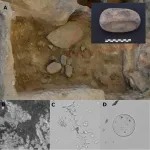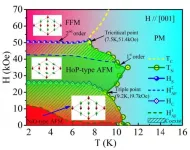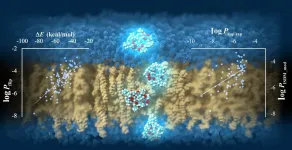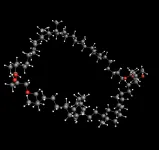(Press-News.org) A clinic to help transgender young people and their families receive quicker support has boosted mental health, family functioning and quality of life, according to a new study.
The research, led by the Murdoch Children's Research Institute (MCRI) and published in Pediatrics, found the clinic in Melbourne led to lower levels of depression and anxiety due to transgender young people being able to access help 10 months sooner.
The study involved 142 patients who completed questionnaires before and after attending the First Assessment Single Session Triage (FASST) clinic at The
Royal Children's Hospital Gender Service (RCHGS).
MCRI Associate Professor Ken Pang said waitlists continued to grow at many gender services worldwide, resulting in wait times of up to two years.
"Many transgender children and adolescents experience gender dysphoria," he said. "They are also at high risk of depression, anxiety, self-harm and suicide, which is likely to be driven not only by gender dysphoria, but also increased exposure to bullying, discrimination, harassment, violence and social isolation.
"Across the globe, increased awareness and understanding of gender diversity have contributed to a marked increase in the number of transgender children and adolescents seeking specialist care. This has placed substantial pressure on clinical resources and wait times for assessment have substantially increased."
To manage this demand, the FASST clinic was established in 2016 to provide information and support to young people, aged 8 to 17 years, and their families. Led by a clinical nurse consultant, FASST has reduced initial wait times by 10 months and triages patients onto a secondary waitlist for additional multidisciplinary care with mental health clinicians and pediatricians.
Associate Professor Pang said the study found the clinic led to improvements in depression, anxiety, quality of life and family functioning.
"Participants found attending the clinic provided validation, not only for themselves, but also their families, classmates and wider communities," he said. "This validation had flow on effects, improving their sense of self, boosting their confidence, and increasing parental understanding, acceptance and support."
Associate Professor Pang said having a child identify as transgender was a momentous change and often highly stressful for families.
"We found that family functioning prior to attending the clinic was at an unhealthy level for many of our participants' families," he said. "But after attending the clinic, this significantly improved."
Mac Zamani, 17, would have been waiting more than a year for support if the FASST clinic didn't exist.
"I didn't know what to expect but I went in with an open mind and found it really rewarding," he said. "The nurse talked me through socially transitioning, mental health concerns, medications, and what other names and pronouns were possible options.
"It was refreshing to have such an easy conversation as you feel these things are still taboo to talk about. "The clinic made me more confident and validated my feelings that this wasn't a phase, which made me a lot less stressed."
Mac said while the relationship with his parents was always one of acceptance the clinic made their bond even stronger.
"My parents appreciated the support too from the nurse as it put them at ease that they were doing and saying all the right things," he said. "They had a lot of questions and the nurse reassured them, which allowed them to block out all the negativity and removed any doubts."
After attending the FASST clinic, Mac was referred to a psychologist, pediatrician and speech therapist at the RCHGS, where he is still a patient today.
"I'd be in a very different place without this support over the past four years," he said. "I consider myself to be one of the lucky ones. I have friends who had very different experiences, parents who weren't supportive and had to wait years to see a psychologist."
Associate Professor Pang also recently received a National Health and Medical Research Council (NHMRC) grant for the Trans20 study aiming to improve the clinical care of young people who receive specialist gender support by identifying the trajectories, outcomes and predictors of their health and well-being.
It comes as a new study, published in The Lancet Child & Adolescent Health by the same research team, found most existing tools which measure gender identity, gender expression or gender dysphoria in transgender children and adolescents have substantial limitations.
Study co-senior author, MCRI's Dr Michelle Tollit, said the majority of existing tools were created before 2000 and reflected outdated beliefs and terminology. Few assess gender identity or dysphoria and hardly any consider the substantial conceptual and cultural shifts regarding non-binary or fluid aspects of gender identity, she said.
Dr Tollit said new tools were needed which were not only specifically designed for transgender children and adolescents and capture modern concepts of gender identity, including non-binary and genderfluid identities, but also use gender affirming language and were psychometrically sound.
Researchers from The Royal Children's Hospital, Western Sydney University, the University of Melbourne, and The Gender Identity Development Service in London contributed to one or both of the studies.
INFORMATION:
Publication: Sarah Dahlgren Allen, Michelle A. Tollit, Rosalind McDougall, Donna Eade, Monsurul Hoq and Ken C. Pang. 'A Waitlist Intervention for Transgender Young People and Psychosocial Outcomes,' Pediatrics. DOI: 10.1542/peds.2020-042762
Publication: Thea M Bloom, Thomas P Nguyen, Francesca Lami, Carmen Pace, Zeffie Poulakis, Michelle Telfer, Amelia Taylor, Kenneth Pang and Michelle A Tollit. 'Measurement tools for gender identity, gender expression, and gender dysphoria in transgender and gender-diverse children and adolescents: a systematic review,' The Lancet Child & Adolescent Health. DOI: 10.1016/ S2352-4642(21)00098-5
*The content of this communication is the sole responsibility of MCRI and does not reflect the views of the NHMRC.
Available for interview:
Dr Ken Pang, MCRI Team Leader, Brain and Mind
Funding:
The Trans20 study is supported by The Royal Children's Hospital Foundation and the National Health and Medical Research Council (APP 2006529) and Michelle Tollit, Ken Pang and Carmen Pace are supported by the Hugh Williamson Foundation.
A study conducted by researchers from the UPF Culture and Socio-Ecological Dynamics research group (CaSEs) and the University of Leicester (UK) has provided a highly dynamic image surrounding the use and importance of hitherto unknown wild plant resources at the Neolithic site of Çatalhöyük (Anatolia, Turkey). The researchers carried out their work combining the analysis of microbotanical remains and use-wear traces in various stone implements recovered from the site, which in the past hosted one of mankind's first agricultural societies.
The researchers carried out their work combining the analysis of microbotanical remains and use-wear traces in various stone implements recovered from ...
Topological semimetals are one of the major discoveries in condensed-matter physics in recent years. The magnetic Weyl semimetal, in which the Weyl nodes can be generated and modulated by magnetization, provides an ideal platform for the investigation of the magnetic field-tunable link between Weyl physics and magnetism.
But due to the lack of appropriate or high quality specimens, most of the theoretically expected magnetic topological semimetals have not been experimentally confirmed. Therefore, exploration of new magnetic topological semimetals is of great importance.
Recently, ...
The absorption of energy from laser light by free electrons in a liquid has been demonstrated for the first time. Until now, this process was observed only in the gas phase. The findings, led by Graz University of Technology, open new doors for ultra-fast electron microscopy.
The investigation and development of materials crucially depends on the ability to observe smallest objects at fastest time scales. The necessary spatial resolution for investigations in the (sub-)atomic range can be achieved with electron microscopy. For the most rapid processes, ...
Artificial microswimmers have received much attention in recent years. By mimicking microbes which convert their surrounding energy into swimming motions, these particles could soon be exploited for many important applications. Yet before this can happen, researchers must develop methods to better control the trajectories of individual microswimmers in complex environments. In a new study published inEPJ E, Shubhadeep Mandal at the Indian Institute of Technology Guwahati (India), and Marco Mazza at the Max Planck Institute for Dynamics and Self-Organisation in Göttingen (Germany) and Loughborough University (UK), show how this control could be achieved using exotic materials named 'nematic liquid crystals' (LCs) - whose viscosity and elasticity can vary depending on the direction ...
A new model tracking the vertical movement of algae-covered microplastic particles offers hope in the fight against plastic waste in our oceans.
Research led by Newcastle University's Dr Hannah Kreczak is the first to identify the processes that underpin the trajectories of microplastics below the ocean surface. Publishing their findings in the journal Limnology and Oceanography the authors analysed how biofouling - the accumulation of algae on the surface of microplastics, impacts the vertical movement of buoyant particles.
The researchers found that particle properties ...
Informing people about how well the new COVID-19 vaccines work could boost uptake among doubters substantially, according to new research.
The study, led by the University of Bristol and published in the British Journal of Health Psychology, shows the importance of raising awareness of vaccine efficacy, especially if it compares very favourably to another well-established vaccine.
The research focused on adults who were unsure about being vaccinated against COVID-19. Those who were given information about the vaccine's efficacy scored 20 per cent higher on a measure ...
Scientists at Tokyo Institute of Technology have developed a computational method based on large-scale molecular dynamics simulations to predict the cell-membrane permeability of cyclic peptides using a supercomputer. Their protocol has exhibited promising accuracy and may become a useful tool for the design and discovery of cyclic peptide drugs, which could help us reach new therapeutic targets inside cells beyond the capabilities of conventional small-molecule drugs or antibody-based drugs.
Cyclic peptide drugs have attracted the attention of major pharmaceutical companies around the world as promising alternatives to ...
Rescuing a member of their own social group, but not a stranger, triggers motivational and social reward centres in rats' brains, suggests a report published today in eLife.
The study provides the first description of similar brain activity in both rats and humans underlying this socially biased behaviour. The findings add to our understanding of social biases and could help with developing ways to promote cooperation outside of an individual's social group.
"Humans, as well as many other creatures, are biased toward helping other members of their social groups ...
Crenarchaeol is a large, closed-loop lipid that is present in the membranes of ammonium-oxidizing archaea, a unicellular life form that exists ubiquitously in the oceans. In comparison to other archaeal membrane lipids, crenarchaeol is very complex and, so far, attempts to confirm its structure by synthesizing the entire molecule have been unsuccessful. Organic chemists from the University of Groningen have taken up this challenge and discovered that the proposed structure for the molecule was largely, but not entirely, correct.
Crenarchaeol contains 86 carbon atoms and is a 'macrocycle, a large closed loop. No fewer than 22 positions in the molecule are chiral. The molecule can be present in two forms that are each other's mirror image, like a left and a right hand. In the crenarchaeol ...
A new University of Iowa study suggests that metabolism of plant-based dietary substances by specific gut bacteria, which are lacking in patients with multiple sclerosis (MS), may provide protection against the disease.
The study led by Ashutosh Mangalam, PhD, UI associate professor of pathology, shows that a diet rich in isoflavone, a phytoestrogen or plant-based compound that resembles estrogen, protects against multiple sclerosis-like symptoms in a mouse model of the disease. Importantly, the isoflavone diet was only protective when the mice had gut microbes capable of breaking ...






